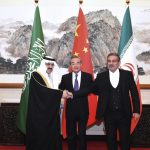
By Ambassador John Bolton
This article was first published in The Washington Examiner on March 20, 2023. Click Here to read the original article.
The competition for “most startling photo of 2023” may already be over. The smiling photo of China’s top foreign-policy official and the Iranian and Saudi Arabian national security advisers looks hard to beat.
China scored a diplomatic win cozying up to Riyadh by exploiting President Joe Biden’s palpable disdain for the Saudis. China also helped rehabilitate Tehran, which has been brutally suppressing its most extensive domestic opposition in the Islamic Republic’s history. Whether this is ultimately more than just a Chinese public relations triumph, however, is still unclear.
Secretary of State Blinken embarrassed himself trying to put a positive spin on the debacle, thereby underlining how marginal the United States was. Equally important was the embarrassment caused to those Americans arguing that to focus adequately on China and its neighborhood, Washington can pretty much ignore everywhere else.
Sen. Josh Hawley (R-MO) is the principal Senate proponent for this approach, arguing that U.S. involvement in Europe (particularly aiding Ukraine) and the Middle East distracts from our ability to contest China in Asia, especially over Taiwan. He voted against admitting Sweden and Finland to NATO, for example, the only senator to do so (Rand Paul voted “present”). Hawley’s quasi-isolationist analysis rests on the flawed assumption that America cannot muster sufficient resources to walk and chew gum at the same time. He says that narrowing our attention to East Asia and the Chinese threat necessarily means reduced US involvement in lower-priority regions.
Of course, resources may be finite at any given point, but responsible political leaders know how to increase them when the times demand, as Ronald Reagan did so successfully. If Hawley’s resource analysis were true, the U.S. is lucky it only had to fight on one front in World War II; otherwise, we surely would have lost.
The “Asia only” argument stresses Beijing’s many threats and highlights the existential menace posed to Taiwan’s continuing self-government, which is no small matter. Having first advocated full U.S. diplomatic recognition of Taiwan in 2000 to counter Beijing’s hegemonic aspirations, I have no disagreement with Hawley’s concerns about Taiwanese security.
Consider, for starters, Washington’s long-standing alliance with Taipei, whether de jure or de facto; Taiwan’s enormous economic importance as a trading partner and focal point of information-technology production and innovation; its critical geographic location in the “first island chain” standing between China and the open Pacific; and the mutual interest of close allies like Japan.
Unfortunately, however, China’s geo-strategists do not view the world through a soda straw, and neither should we. Beijing’s diplomatic coup de main with Iran and Saudi Arabia should shatter any illusions that our struggle with China is anything less than global. If the U.S. deprioritizes or abandons a geographic area, it is simply an invitation to Beijing (and Moscow) to enter and fill the vacuum we create.
In the Middle East, adding insult to injury are last week’s joint naval maneuvers by China, Russia, and Iran in the Gulf of Oman(just outside the Strait of Hormuz). These drills, so near to critical Gulf Arab hydrocarbon producers, are tangible evidence that China is vigorously contesting U.S. influence region-wide, militarily as well as politically. Inevitable future Sino-American crises will undoubtedly involve clashes over critical energy supplies.
Examples of China’s global reach and agility are all too plentiful. Reflecting years of China’s successful efforts to penetrate the Western Hemisphere, for example, Brazil’s left-wing President Lula da Silva is taking a delegation of 240 business people on a weeklong visit to Beijing and Shanghai. Chinese infiltration in Venezuela, Cuba, and Nicaragua, bolstering Russia’s faltering presence, has also long been underway covertly. Both Lula’s trip and the Iran-Saudi ploy are consistent with Xi Jinping’s “Global Security Initiative,” expressly melding economic and security concerns to China’s advantage and leaving Washington again on the sidelines.
Tellingly, notwithstanding an International Criminal Court arrest warrant for Vladimir Putin, Xi is now visiting Moscow to discuss their “no limits” alliance. So disdainful is Putin of the court that he made a surprise trip to occupied Ukraine, including visiting children’s care facilities. No comment from China.
Purportedly shopping a Russian-Ukraine “peace plan,” Xi is actually demonstrating that he has been and remains entirely on Putin’s side in the Ukraine war. Indeed, there are reports that China intends to or already is shipping weapons to Russia, or at a minimum, providing support fungible with lethal aid. China, for all practical purposes, is as much involved politically in Europe’s ongoing war as the U.S.
To his credit, Hawley has received harsh criticism from China because of his opposition to its threatening behavior. And if he continues his good work on China, I will surely, in due course, warmly welcome him to the honor roll of officially sanctioned Americans, he hopefully having long since discarded the “Asia only” outlook.
John Bolton was the national security adviser to former President Donald Trump between 2018 and 2019. Between 2005 and 2006, he was the U.S. ambassador to the United Nations.